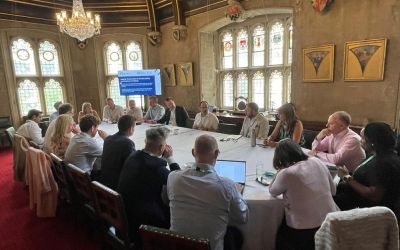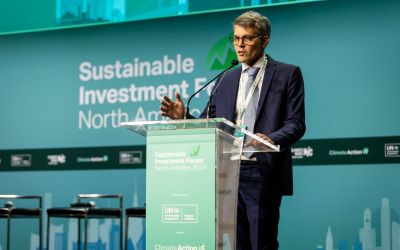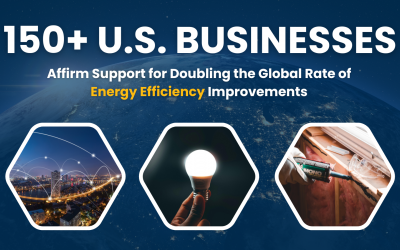Laura Zizzo on the important role climate tech will play in supporting the global climate response
After the Sustainable Investment Forum Europe, Climate Action caught up with Laura Zizzo, Co-Founder and CEO at Manifest Climate, to discuss the important role climate tech will play in supporting the global climate response.

After the Sustainable Investment Forum Europe, Climate Action caught up with Laura Zizzo, Co-Founder and CEO at Manifest Climate, to discuss the important role climate tech will play in supporting the global climate response.
How has or can climate tech best support the global climate response?
Every major social and economic transformation has been fast-tracked by better tech – from travel and healthcare, to education and finance. But these big transformations only happen when new tech is used appropriately alongside expertise, and is widely available. The climate space is yearning for its technology moment and we’re at the heart of it. Companies now need agile tools at their disposal to effectively surface risks, opportunities, and to stay on top of changing scenarios in order to make smart strategic decisions. Manifest Climate provides companies with decision-useful information on their climate journeys, including insights on how to level-up. In a world where there is endless climate information and tangents, we cut-through chaos and prioritise the most essential information on climate based on our clients’ specific needs. The Manifest Climate Platform is unique in that it leverages machine learning algorithms to surface best practices in the climate field, rapidly generate disclosure reviews and recommendations, alongside ongoing support from world leading climate experts. The same work that previously took climate experts days and weeks to accomplish can now be done in much less time and at a fraction of the price with our platform. Given our commitment and expertise in the emerging global standard for climate disclosure, our platform is purpose-built to strengthen capital market transparency and accelerate global climate action across industries.
What are the right climate-related questions to be asking to empower decision-makers to make better decisions? To what extent can quantification and measurement support climate action?
Quantification and measurements matter but they are not the bottom line when it comes to climate action. Real climate progress is made through better management, and importantly, better governance. Companies can perform better in their climate journeys if the right people in their teams are focused on the material issues and iterative processes. From a climate risk planning perspective, companies that want to thrive should implement well-executed climate governance policies first. It starts at the top. Cross-functional professionals aiming to manage climate risk and seize opportunity can bring about change by asking: Who’s in charge? What’s the plan? How are we tracking progress? These are the questions that engender true climate action and progress.
Do you think that tackling global climate change and meeting net zero commitments cannot be achieved without significant investment in climate tech innovations?
Bank of America estimates that it will take $150 trillion in the next 30 years to transition to net-zero. This is a huge transitional risk and massive opportunity as well. Climate change is the most significant and poorly understood issue societies are currently facing and require significant advancements in climate tech innovations to support an economic transition to net-zero. These advancements will require significant investment, but this investment is overshadowed by the costs we will face as a result of the physical risks that will emerge if we don’t effectively transition to a low-carbon economy and fulfil net zero commitments. The costs of not transitioning are untenable. The opportunity to drive the transition and create a more resilient economy is imperative and exciting, and it will be supported by smart climate technology to create new best practices and spur innovative solutions.
Can you give some examples as to how Manifest Climate is helping leaders take effective climate action? What solutions do you offer to enable industry players to embed climate action into their everyday processes?
We have partnered with many leading firms to help guide them on their climate journeys. Some of our clients include Scotiabank, Manulife, Teck Resources, BentallGreenOak, Loomis Sayles. We use a Task Force on Climate-related Financial Disclosures (TCFD)-aligned methodology that assesses a company’s existing disclosures and internal actions against industry benchmarks and standards and provides actionable insights and recommendations to implement in order to strengthen and improve its climate processes. In this manner, we are able to support real change where and when it is most needed. For instance, our work allowed a large globally focused bank to significantly evolve its risk management framework leading to the integration of risk factors into organisational processes. We helped the cross-functional institution to solidify its position in the transition to a low carbon economy, with the positive effect of positively impacting its reputation as a climate leader within the banking sector. For another complex financial institution with similar cross-functional needs, our platform was utilised to build team competency on climate risks and opportunities, conducted a scenario analysis that included understanding design options and frameworks for identifying climate issues, and established a cross-functional internal working group to ensure ongoing implementation of the scenario analysis. Through these approaches, we were able to reduce climate risk and support local resilience building for the firm’s owners.
How can AI enhance TCFD reporting and disclosure and bring more ESG data clarity to capital markets?
AI allows us to do more effectively and efficiently. It optimises the work of our climate strategists by translate their expertise into scalable technology and surfaces climate-related processes, risks and opportunities and best practices that would normally take days or weeks to identify. As the impacts of the climate crisis become more urgent, capital market players are increasingly seeking clarity on how businesses are building climate resiliency and maintaining financial performance. Manifest’s AI-powered platform provides organisations with a TCFD-based climate maturity assessment, which surfaces best practice disclosure examples, and relevant climate-related market trends for their business. As such, our software helps to bring transparency of climate risk and opportunity to capital markets while demonstrating to management, boards and shareholders the value of understanding and communicating on climate.
In the area of sustainable finance and responsible investors, although there are several tools and solutions to measure climate change and impact, several asset owners and investors often complain of the lack of good quality data- yet there are several players in the field. How do you differentiate yourselves at Manifest Climate in your ESG and data mining solutions?
Climate goes beyond the E in ESG. Our perspective is that ESG reporting should start with climate-related considerations (aligned with the Task Force on Climate-related Financial Disclosures (TCFD)). Our proprietary TCFD-aligned methodology provides a good basis to achieve this. Based on over a decade of experience supporting leading North American organisations on their climate journeys, and increasing uptake in Europe, we have a repository of best practices and insights. So our tools, methodology and ongoing climate support by real expertise offer clients relevant, real-time insights to support strategic decision-making and strengthen implementation plans.
Do you agree that AI technology won’t be created by the tech sector alone? What does creating better climate friendly future require from government, academia, business, civil society, and other interested stakeholders? Does this require collaboration across all sectors of sector?
The short answer is yes, it does. Climate change is so pervasive that it impacts all sectors on all levels and therefore the most effective responses to this whole-society and whole-economy challenge requires collaboration from all sectors. It’s an all-hands-on-deck opportunity! It is such an unprecedented existential crisis that one sector alone cannot possibly tackle it. This won’t happen all at once, we must get started and remain open to expanding the tent. In terms of AI technology, we also want substantial and broad-based sectoral insights to shape our tool. This is how we ensure broad and effective adoption.
Laura Zizzo spoke at the Sustainable Investment Forum Europe 2022, watch all sessions on demand by clicking here.





